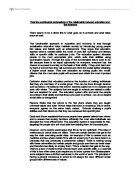Describe the different purposes of education according to different sociological perspectives.
Michelle Lambe 13 A
Describe the different purposes of education according to different sociological perspectives.
Education as a whole is a vital part of socialisation, and has been called the ‘secondary’ socialisation after the family. Functionalism confirms this theory with the idea that education is another social system within the structure, helping the society to function.
Parsons states that the school compensates for the defective socialisation sometimes present, especially in dysfunctional families. For example some families may fail to instate the morals of society and so that is left up to the school. Merton continues the theory by concluding that within the family the status is ascribed and therefore does not reflect the real world. In the school status has to be achieved and is only done so on merits providing a better preparation for the outside world. This is a preferable socialisation as the wider society expects and relies upon achieved status. Ottoway & North suggest that the schools are useful because they pass on knowledge and skills to the next generation, this is to keep society functioning. It also sustains and in the long term will improve present knowledge. Moore & Davies back up this theory stating that the school provides an ‘economic placement’. Through qualifications, it allocates placements of individuals into the employment structure. Durkheim incorporates all of these theory’s primarily concerned with the idea that the school is the compensatory socialisation for morals and values not instilled into individuals at home.







